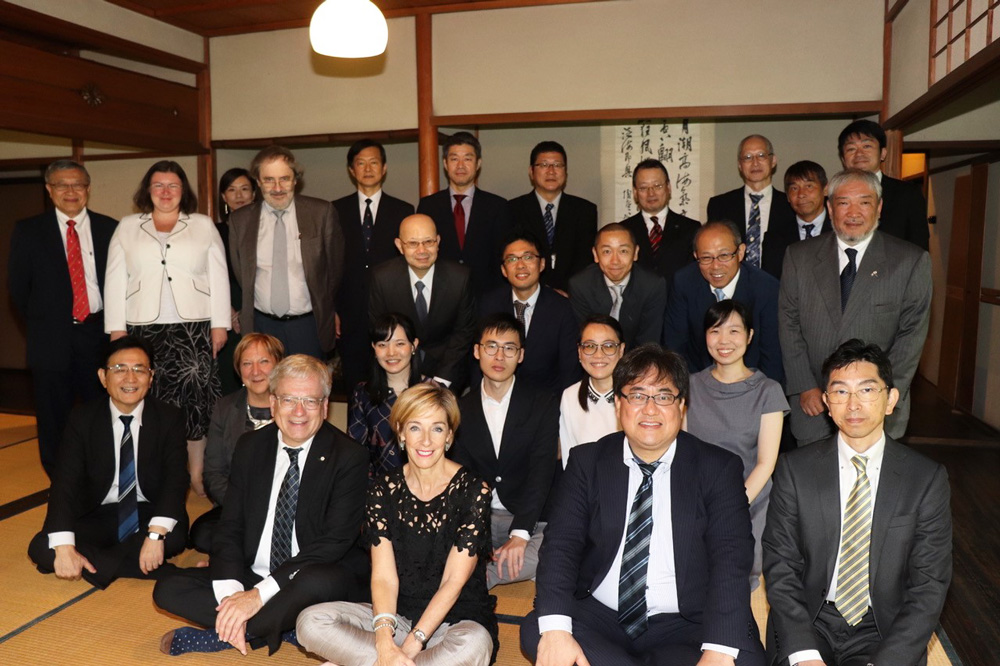
McGill University and Kyoto University have joined forces to establish a joint Ph.D. program in genomic medicine, the first of its kind for McGill. In Japan to attend the signing ceremony for McGill’s partnership agreement with RIKEN and the FRQ, Vice-Principal (Research and Innovation) Martha Crago, attended the inauguration ceremony for the program on the behalf of Dean of Graduate and Postdoctoral Studies, Dr. Josephine Nalbantoglu.
“One of my priorities as Dean of Graduate and Postdoctoral Studies at McGill is to expand the range of international training opportunities for our graduate students,” said Dean Nalbantoglu. “The joint Ph.D. program with Kyoto University directly supports this goal, drawing on the complementary strengths of the two institutions to deliver world-class training to the next generation of researchers in genomic medicine.”
Under the terms of the joint Ph.D., students will undertake research-intensive training in large-scale data approaches to biology using quantitative methodologies, with a focus on human health and disease. Established with support from the Ministry of Education, Culture, Sports, Science and Technology-Japan (MEXT) under its Top Global University Project, students accepted into the joint degree program will share their time between the two universities.
“A signature achievement”
The Canadian Ambassador to Japan, Ian Burney, offered his congratulations to both McGill and to Kyoto University via Christine Callahan, Second Secretary of Public Affairs: “In academic relations, two world-leading universities collaborating on the latest developments at the frontier of our understanding of human biology is a signature achievement,” he said.
The Ambassador also encouraged the students enrolled in the program to benefit from both the academic and personal opportunities afforded to them by their participation in the joint program. “It is people-to-people connections that underpin the vibrant Canada-Japan relationship,” he added.
The signing ceremony took place in Seifu-so, a heritage building dating to 1732 and belonging to the noble Tokudaiji family, who were integral to the founding of Kyoto University. The villa is now under the stewardship of Kyoto University.
Two excellent universities join forces
For the 14th consecutive year, McGill ranks 1st in Canada among medical-doctoral universities (Maclean’s). Kyoto University, for its part, has 10 Nobel Laureates among its professoriate, more than any other Japanese university. They include this year’s Nobel Prize for Medicine and physiology winner, Dr. Tasuku Honjo. Dr. Honjo supervised Dr. Fumihiko Matsuda, who will in turn supervise at least one of the students enrolled in the inaugural joint Ph.D. class.
McGill’s relationship with Kyoto University dates to 2013, when the first in a series of joint training workshops were held. In 2014, a five-year MOU and a Student Exchange Agreement were signed, followed by a Memorandum of Agreement between the two Faculties of Medicine to promote education and scientific research in the areas of genomics and computational medicine.
Talks about the creation of the joint Ph.D. program began in 2015 and finalized during a Quebec government mission to Japan in March 2017. During a subsequent visit by Kyoto to McGill in 2017, the Fonds de Recherche du Québec committed student-focused financial support of $50,000 per year. In January of this year, representatives from Kyoto University visited McGill for the first Deans’ Liaison Meeting and agreement exchange ceremony.
The first cohort of students began their work in the spring and the next Nobel Laureate may just be among them. “The enthusiasm of the first cohort of students is contagious,” said Dean Nalbantoglu. “I am convinced they will go on to conduct cutting-edge research to expand the frontiers of science and generate truly innovative solutions to challenges faced by society today.”
